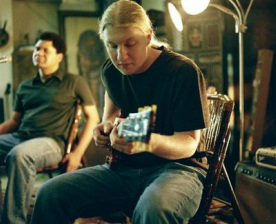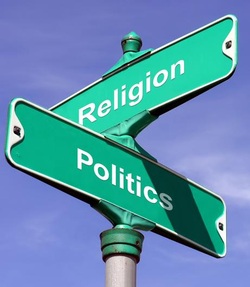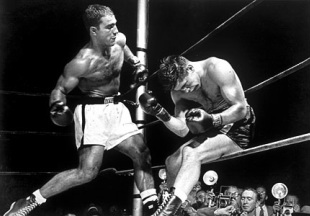Vagrant Contemplation - "random Thoughts on just about everything"

"There are simply two kinds of music, good music and the other kind"... Duke Ellington
Every generation produces something of value. But what was once mainstream, Dylan, Hendrix, Sam Cooke, or for that matter, Benny Goodman and Woody Herman no longer is—meaning musicians who can actually play at a high level. Derek Trucks and band for example, are as good as many of the best artists of the last 45 years. And where they sell records and concert tickets, it’s a fraction of what Madonna or Justin Beiber sell.
The market has changed so much, with the internet, that it may not be feasible to develop talent the way the industry once did, which meant investing for the long haul, while losing money in the short term. On the bright side, inexpensive recording technology has made it possible to record with equipment that’s far better than anything dreamed of by The Beatles or Miles Davis in their heyday. And the internet has given musicians as well as artists of every kind a forum in which to speak, offering some truly fine performers the opportunity to be heard without having to go through a small handful of labels that control and dominate the business.
The effect has been democratizing to say the least. But if you are dreaming of being one of the few shining stars who make all the money, you’re going to have to think differently. In the end, what’s happening is for the good. A lot’ a people will make a lot ’a music, most of it won’t be very good, but enough will. And the sheer volume will do the rest. Such is the nature of both democracy and art.
Every generation produces something of value. But what was once mainstream, Dylan, Hendrix, Sam Cooke, or for that matter, Benny Goodman and Woody Herman no longer is—meaning musicians who can actually play at a high level. Derek Trucks and band for example, are as good as many of the best artists of the last 45 years. And where they sell records and concert tickets, it’s a fraction of what Madonna or Justin Beiber sell.
The market has changed so much, with the internet, that it may not be feasible to develop talent the way the industry once did, which meant investing for the long haul, while losing money in the short term. On the bright side, inexpensive recording technology has made it possible to record with equipment that’s far better than anything dreamed of by The Beatles or Miles Davis in their heyday. And the internet has given musicians as well as artists of every kind a forum in which to speak, offering some truly fine performers the opportunity to be heard without having to go through a small handful of labels that control and dominate the business.
The effect has been democratizing to say the least. But if you are dreaming of being one of the few shining stars who make all the money, you’re going to have to think differently. In the end, what’s happening is for the good. A lot’ a people will make a lot ’a music, most of it won’t be very good, but enough will. And the sheer volume will do the rest. Such is the nature of both democracy and art.
Imagined Inequality

Inequity, the lack of equality, the way things should be. Does there have to be winners and losers? Should we eliminate grades, as some schools have attempted to do, so that the stigma of failure is erased and people’s feelings aren’t hurt? What does it meant to be equal? Can two athletes compete and both win?
These questions almost always illicit an immediate emotional response, depending of course on how the question is posed—ask any adult, or kid for that matter, whether they should be rewarded for their hard work and success and the answer is a near universal…."of course"! Ask the same question in a slightly different way, and the answer is likely to change--"should we, as a culture strive to help those that are less fortunate, in order to insure that all people, regardless of race, ethnicity, religious background, or sex have equal opportunity"? The answer for most of us is a resounding “yes”! Fairness is good and inequality is bad. Ask the question in a slightly different way; "should you have to work to support others who don’t or won’t work, or give up your grade point average to someone who hasn’t studied as hard so they don’t have to feel like a failure"—and the response is likely to change.....radically. Context is everything, without it we have no hope of rightly judging the merit of anything. That is true in a court of law and no less true in everyday life.
Merit and achievement in a classroom, on the playing field, or in the workplace is easy to understand. That is, until politics rears its head and group identity becomes the primary way in which benefits are distributed.
Politicians and lawyers share a similar image problem. We even have jokes that allow us to interchange one with the other; “What’s the difference between a lawyer/politician and a mosquito? One’s a blood sucking parasite and the others an insect!”
So, how is it that we move from a general belief that politicians, most of who have at least some background as Lawyers, are likely to be wise and beneficent enough to not only govern, but make personal decisions for the rest of us that we're far better equipped to make for ourselves? In this instance the belief seems to be that government, which is made up of real, living, breathing, human beings, just like us, can and will lead us into the promised land of wisdom, peace and prosperity. The idea of the bloodsucking lawyer or crooked politician is replaced with the idea of the enlightened leader, one that generally thinks and believes as we do. They become our proxies, acting on our behalf, for the good of all. Nothing has changed mind you, the answer remains the same. The problem isn't the question, but our inability to recognize the true intent behind the question that is the real problem.
These questions almost always illicit an immediate emotional response, depending of course on how the question is posed—ask any adult, or kid for that matter, whether they should be rewarded for their hard work and success and the answer is a near universal…."of course"! Ask the same question in a slightly different way, and the answer is likely to change--"should we, as a culture strive to help those that are less fortunate, in order to insure that all people, regardless of race, ethnicity, religious background, or sex have equal opportunity"? The answer for most of us is a resounding “yes”! Fairness is good and inequality is bad. Ask the question in a slightly different way; "should you have to work to support others who don’t or won’t work, or give up your grade point average to someone who hasn’t studied as hard so they don’t have to feel like a failure"—and the response is likely to change.....radically. Context is everything, without it we have no hope of rightly judging the merit of anything. That is true in a court of law and no less true in everyday life.
Merit and achievement in a classroom, on the playing field, or in the workplace is easy to understand. That is, until politics rears its head and group identity becomes the primary way in which benefits are distributed.
Politicians and lawyers share a similar image problem. We even have jokes that allow us to interchange one with the other; “What’s the difference between a lawyer/politician and a mosquito? One’s a blood sucking parasite and the others an insect!”
So, how is it that we move from a general belief that politicians, most of who have at least some background as Lawyers, are likely to be wise and beneficent enough to not only govern, but make personal decisions for the rest of us that we're far better equipped to make for ourselves? In this instance the belief seems to be that government, which is made up of real, living, breathing, human beings, just like us, can and will lead us into the promised land of wisdom, peace and prosperity. The idea of the bloodsucking lawyer or crooked politician is replaced with the idea of the enlightened leader, one that generally thinks and believes as we do. They become our proxies, acting on our behalf, for the good of all. Nothing has changed mind you, the answer remains the same. The problem isn't the question, but our inability to recognize the true intent behind the question that is the real problem.
Religion, Politics, Science

Real science begins with a hypothesis (a guess) asking; what might really be happening? Only after looking at all the variables and determining how they impact your findings do you tentatively form a conclusion. The emphasis is on “all of the facts” not just those facts that make your case, as a lawyer does when making an argument in a court of law. You then publish your findings so that your conclusion can be tested to see if it's consistent and will hold up to the scrutiny of other scientists with different opinions. It’s a very necessary contest of competing ideas, in theory, no different than a football game or a boxing match.
Politics is about winning (getting elected). Politicians, out of necessity tend to be primarily interested in those facts that create support (money) for their campaigns. Politicians and their supporters want to reinforce their political convictions (beliefs) just like religious people—meaning that politicians and scientists become priests when they abandon objectivity in favor of opinion.
It’s not good intentions, but good ideas rooted in objectivity and reason, hopefully leavened by some modest degree of selfless morality and open to dissent, that’s the basis for a healthy culture. Not selling the public on a particular political, scientific or religious leader.
The public is a very necessary referee or jury, determining which politician has the best ideas. If , however, the public can’t make reasonable decisions, because they can’t or won’t work to understand the issues, politicians, priests and scientists will be all to happy to make those decisions for them. And then you can be sure that the power to restrain the excessive impulses of the powerful, will likely be sacrificed for comfort and ease of mind. But not for long!
Politics is about winning (getting elected). Politicians, out of necessity tend to be primarily interested in those facts that create support (money) for their campaigns. Politicians and their supporters want to reinforce their political convictions (beliefs) just like religious people—meaning that politicians and scientists become priests when they abandon objectivity in favor of opinion.
It’s not good intentions, but good ideas rooted in objectivity and reason, hopefully leavened by some modest degree of selfless morality and open to dissent, that’s the basis for a healthy culture. Not selling the public on a particular political, scientific or religious leader.
The public is a very necessary referee or jury, determining which politician has the best ideas. If , however, the public can’t make reasonable decisions, because they can’t or won’t work to understand the issues, politicians, priests and scientists will be all to happy to make those decisions for them. And then you can be sure that the power to restrain the excessive impulses of the powerful, will likely be sacrificed for comfort and ease of mind. But not for long!
Fighting and the good society

Back in the day I would regularly go to a local boxing gym and work out. I would hit the heavy bag, shadow – box, do a hundred sit–ups to strengthen my stomach muscles, run three miles and then spar three rounds with whatever sparring partners were available. Sometimes they were novices, oftentimes they were far more experienced than me—golden gloves champions, ex – pros looking to stay in shape, fighters preparing for an up and coming fight. Inevitably, it was a food chain. You got beat up every day until you started becoming the one who was doing the beating. Moving up the chain, fist over fist—looking to become the man who would replace the man—fending off all comers. As uncivilized as it sounds, it was an efficient process. If you wanted to compete, you laced up the gloves, put in a mouthpiece and began to slug. If you didn't really have it in you—you found out pretty quickly. Those few that stayed did so because they wanted to, not because they had to. The squared circle became a laboratory—where pugilists tested the efficiency of their ideas, finding out what worked, while eliminating what didn't with all due speed! There was no time for contemplating the meaning of a punch to the face. Its implications were obvious
This process is at time lost on artists, and too often on intellectuals, and reflects a very unscientific assumption; that a superior mind is defined by a superior education. For the athlete, actions speak louder than words—and those that can’t do, teach; seeking the safety of the classroom or the laboratory. Likewise, the martial artist that can’t fight retreats to the dojo where their theories are placed beyond the bounds of scrutiny, like the academic safely ensconced in an ivory tower, impenetrable by the world beyond, free from the burden of having to put up, or shut up!
Mark Magula
This process is at time lost on artists, and too often on intellectuals, and reflects a very unscientific assumption; that a superior mind is defined by a superior education. For the athlete, actions speak louder than words—and those that can’t do, teach; seeking the safety of the classroom or the laboratory. Likewise, the martial artist that can’t fight retreats to the dojo where their theories are placed beyond the bounds of scrutiny, like the academic safely ensconced in an ivory tower, impenetrable by the world beyond, free from the burden of having to put up, or shut up!
Mark Magula
|
|
|